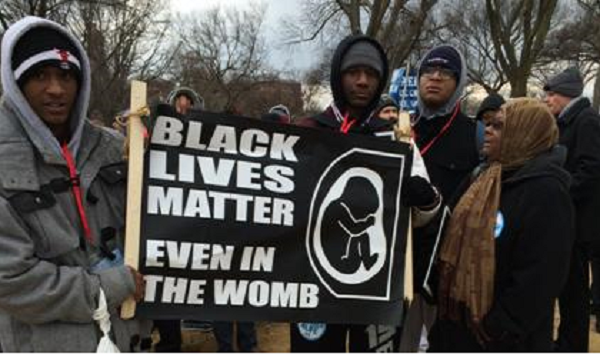Prejudice invokes a dehumanizing invisibility. As Civil Rights leaders today rightly assert, all black lives matter and should never be treated as expendable. True justice demands recognizing black lives matter– not just when we can see them readily– but in the womb as well.
A 2010 study found the percentage of African Americans living in neighborhoods near Planned Parenthood higher than either the city or state average. More Black babies are aborted than born in New York city, a fact that recently led Dr. Freda Bush, an African American OBGYN, to urge recognition that abortion is reproductive injustice to the women involved and to the black community.
Civil Rights Begin When Life Begins
While higher abortion numbers among minorities is assumed to reflect higher rates of unintended pregnancies, more frequent life changes and resulting failure to correctly use contraception, these may all be ways to skirt what abortion accomplishes: the disproportionate elimination of minority people. Of course, black lives matter–but when do they start to matter?

Those supporting abortion often do so from a desire to liberate minority women from economic oppression. For African American women, who have not generally identified with the economic opportunities historically afforded to others, abortion may appear to promise escape from poverty. As this Abort 73 video suggests, however, if abortion is extended to Black women as affirmative action, equality is accomplished at devastating cost to the African American community.
Especially when considering Planned Parenthood’s eugenics history, these statistics call for a reassessment of abortion’s presumed racial benefits. John Piper describes abortion’s racist effect:
The de facto effect (I don’t call it the main cause, but net effect) of putting abortion clinics in the urban centers is that the abortion of Hispanic and Black babies is more than double their percentage of the population. … Call this what you will—when the slaughter has an ethnic face and the percentages are double that of the white community and the killers are almost all white, something is going on here that ought to make the lovers of racial equality and racial harmony wake up.
Piper’s use of the phrase “wake up” is significant, as we learn from history that after WWII, German citizens stated they were unaware of concentration camp atrocities in their midst. Similarly, the majority of Americans would no doubt confess they are unaware of what takes place at the Planned Parenthood nearest them. Abortion invisibilizes–both literally and in the consciousness of the community–the lives and identities of those targeted.
Abortion and Sex Slaves With Minority Faces
Human trafficking is only recently coming to the attention of the average American; abortion’s role in today’s slave market should also be widely recognized. Since Roe, the dominant narrative views pregnancy as a form of slavery and abortion as historically a means of resistance to male oppression. Yet, this claim is challenged by the facts showing that abortion-deaths among African Americans outnumber those from all other causes.
While abortion is widely available, it has not hindered financial exploitation of Black women but has actually aided sex trafficking— the predominant present day form of slavery. During antebellum days, Black women could be raped and treated like animals simply for economic benefit. Human trafficking today involves similar treatment and is also incredibly lucrative, and those forced into slavery today are not just foreign nationals. In fact, Jamaal Bell notes the close connection between modern sex slavery and race, pointing to the Bureau of Justice Statistics showing 77 % of sex trafficking victims are Black and other minority women. One of the identified risks of sex trafficking is, you guessed it, forced abortions.
Abortion Involves Force and Torture, Just Like Slavery
Those drawing the connection between abortion support and slavery or eugenics do not claim every pro-choicer favors black genocide. However, it is increasingly hard to ignore the fact that abortion resembles slavery in effect. Consider for instance, force is slavery’s defining characteristic and is also mentioned by those describing their experience of abortion. In one study, the majority of women–64 % of those surveyed– reported feeling coerced or forced to abort. As with the mode of modern day sex slavery, abortion often involves violence, manipulation, and threats.
According to studies in the Journal of the American Medical Association, pregnant women have been abused, tortured and even killed when resisting unwanted abortion. Black prenatal lives are the most vulnerable to shotgun abortions. The least visible in our society by virtue of their size and race, preborn African Americans are frequently in jeopardy from sanitized racism, an outlook that implicitly regards minority children yet to be born as expendable, most perniciously illustrated recently by John Gruber’s use of the term “marginal” to claim abortion as a social good.
Of course, many documented historical links implicate America in eugenics. Shawn Welcome’s epic poem called “Civil War” powerfully depicts the African American experience of the slave era to make a case for abortion as our national conflict, with again Blacks pushed to the front lines, only this time toward cultural suicide “all in the name of freedom…”
Abortion and its aftermath, as detailed by the deVeber Institute, is often experienced as anything but liberating. Dr. Karen Stevenson, an African-American psychiatrist said: “I have encountered tortured women who were struggling with depression, suicidal thoughts, anxiety, and drug and alcohol abuse who have had encounters with this thing called ‘the women’s right to choose.‘
Significantly, an African American woman recently chose to employ images of freedom from bondage to describe her healing from abortion.







